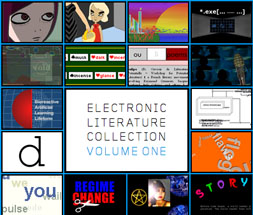 The first volume of the Electronic Literature Organization's anthology of new-media work turned up in my mailbox last week, and it's simply stunning.
The first volume of the Electronic Literature Organization's anthology of new-media work turned up in my mailbox last week, and it's simply stunning.Edited by N. Katherine Hayles, Nick Monfort, Scott Rettberg, and Stephanie Strickland, the collection has brought together in one place for the first time 60 of the most influential and significant digital texts from the last fifteen years or so. Included are projects by Edward Falco, Shelley Jackson, Michael Joyce, Deena Larsen, Talan Memmott, Judd Morrissey, Stuart Moulthrop, Kate Pullinger, Jim Rosenberg, Alan Sondheim, Rob Wittig, and others from the U.S.A., Canada, the U.K., France, Germany, and Australia. Each work is prefaced by a brief editorial description and author bio, and tagged with descriptive keywords for easy cross-referencing.
The compilation presents a broad overview of the field of electronic literature: hypertext, kinetic language experiments, generative and combinatory forms, network writing, codework, 3D, and narrative animations. Sampling the results, you can't help sensing distinctions between such unicorns as "poetry" and "fiction" (even "text" and "image," or "language" and "film") seem ever blurrier and more anachronistic—except in the minds of marketing engineers, librarians, book sellers, and reviewers.
Interestingly, the anthology is being published under a Creative Commons License, so readers are free to copy and share any of the pieces—or, say, install the whole on every computer in a school’s computer lab—without paying any licensing fees.
E.L.O., established in 1999 to promote and facilitate the writing, publishing, and reading of e-literature, is offering the collection in two formats at no cost: CD-ROM (which runs on both Windows and Mac) and web-based. For the former, the editors ask that you request a copy by writing to: Electronic Literature Organization, Maryland Institute for Technology in the Humanities (MITH), B0131 McKeldin Library, University of Maryland, College Park, MD 20742. For the latter, just click here. The collection will also be included with N. Katherine Hayles’s book, Electronic Literature: Teaching, Interpreting, Playing, forthcoming from Notre Dame University Press in 2007.
2 comments:
As you say, this is amazing material, Lance, no doubt about it.
Does anybody know if there's any advantage to having the CD-Rom version over simply going to the website? I'm asking particularly in the context of teaching; it seems like it might be easiest simply to direct students to the site, but there might be some piece of information here that I'm missing.
In any case, wow.
Mark
Sorry to be so long in responding to this, Mark, but I've been out of the country for a few weeks and am still in that maelstrom called catching up.
There's no difference at all between the CD-Rom and web version of the collection, so I prefer the ease of the latter, but the former is nice when you're on the road and aren't connected.
Post a Comment